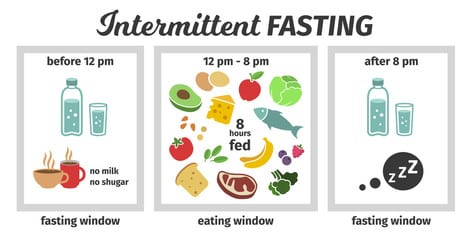Intermittent Fasting is not something very serious that needs to be done prominently. Intermittent fasting is a routine that several women follow to balance their hormones during menopause.
In this process, women eat in alternating cycles that also include fasting periods. In recent years it has come to light because of the health benefits it has been giving to women for all these years.
Weight loss, the sensitivity of improved insulin, and lower inflammation. However, when we are talking about menopause, intermittent fasting plays a very important and positive role
in balancing the hormones.
When a woman is in the menopausal phase, she faces a lot of changes in her body, such as low estrogen levels, which leads to a number of symptoms like hot flashes, mood swings, and disturbances during sleep.
During the intermittent fasting phase, women have realized the production of hormones that energize the ovaries and adrenals. These hormones are called kisspeptin and produce estrogen and progesterone, which help in lightening the symptoms that come along with menopause.
Intermittent Fasting for Menopause
As you read earlier, intermittent fasting is a process in which women have a dietary schedule that includes eating for a certain period of time in the whole day and excluding all types of calories.
But now the question arises how it benefits women who are going through menopause? Here in this section of the article, you will get your answer, so continue reading.
Balancing the Hormones
As you must be knowing, the two hormones estrogen and progesterone play an important role in menopause and hormonal changes, but these two also affect the woman's reproductive health and cause an imbalance in the hormones. There is a rise in symptoms such as hot flashes, night sweats, weight gain, and mood swings due to the imbalance in hormones.
Intermittent fasting helps in restoring the hormonal balance when you are in menopause. And as you read before, it releases a hormone called kisspeptin that refreshes the ovaries and the adrenals to produce estrogen and progesterone. This hormone also has control over a hungry hormone called ghrelin besides increasing leptin which is a satisfactory hormone that is responsible for reducing cravings for food that eventually helps in maintaining a balanced weight.
Apart from maintaining a healthy weight, intermittent fasting helps in an improved quality of sleep which is very much effective during this phase and maintains the hormonal balance. Fasting rectifies the sleep pattern, and eventually, you get stuck to it. Better sleep reduces stress, anxiety, and depression, which further helps in improving hormonal balance.
Practical Tips for Hormonal Balance
Intermittent fasting, IF in short, is an effective way to manage the symptoms that occur during menopause, like weight gain, hot flashes, and disturbances during sleep. However, addressing intermittent fasting while going through menopause is necessary to consider.
In this section, there are some practical tips to follow for balancing the hormonal changes in your body.
Selecting the Right Chastity
There are different fasting methods that can be followed when you choose intermittent fasting. The one that has been opted for mostly by women in menopause is the 16/8 method. This method involves fasting for 16 straight hours and eating within 8 hours in 24 hours.
The next method is 5:2. This involves eating normally for 5 days but avoiding calories for 2 days. If you do detailed research on Intermittent fasting for menopause belly, you will get a list of methods that you can select and implement in your life accordingly.
Focusing on Nutrition
Intermittent fasting helps you maintain a healthy weight, but it is also necessary to focus on the nutrition you are eating while fasting. Eating a balanced diet is fine, but the diet must have nutrition in accordance with your body's needs, like fruits and vegetables, lots of proteins, and healthy fats.
Prepackaged food has always been considered unhealthy, so it is useless to repeatedly tell you the factors and disadvantages of eating processed foods. Drinks containing high amounts of sugar and saturated fatty acids are a plus to destroying your natural body and hormones. During menopause, your internals become delicate, just like an infant, so taking proper care is a must!
Be Consistent with your Schedule
Once you are focused on maintaining a routine, you will notice all the positivity that comes along with following it. While you are in menopause, make a schedule for yourself to eat healthy and continue to work. Follow the routine daily without fail so that it becomes easy for you to deal with the phase easily and smoothly. By sticking to the intermittent schedule, you will see that you are getting regular carvings for food and proper sleep. This will automatically make you calm and happy for the rest of your life. If by any chance you see yourself slipping from the schedule, make sure you get back as soon as possible.
Listen to your Body
When practicing intermittent fasting, it is very important to listen to your body when you are in menopause. Pay proper attention to how you are feeling during the phase and how the methods are working according to your decided schedule. If you feel unsteady, weak, or starving, that means that's the time when you need to break your fasting and start eating.
Keep in mind that the only motive is to have a proper healthy body, not a tired or weak one. So it is absolutely necessary to maintain your diet in such a way that it does not affect your body by any means. Never try to push or force yourself beyond the limit. Listen to your body and implement things accordingly.
Henceforth, these are some tips that you require in order to maintain your hormonal balance and experience the benefits of intermittent fasting.
Conclusion
Intermittent fasting is a promising approach for managing menopause symptoms and achieving hormonal balance. By restricting your eating window and consuming fewer calories, you can regulate your blood sugar levels, reduce inflammation, and support your body's natural detoxification processes.



